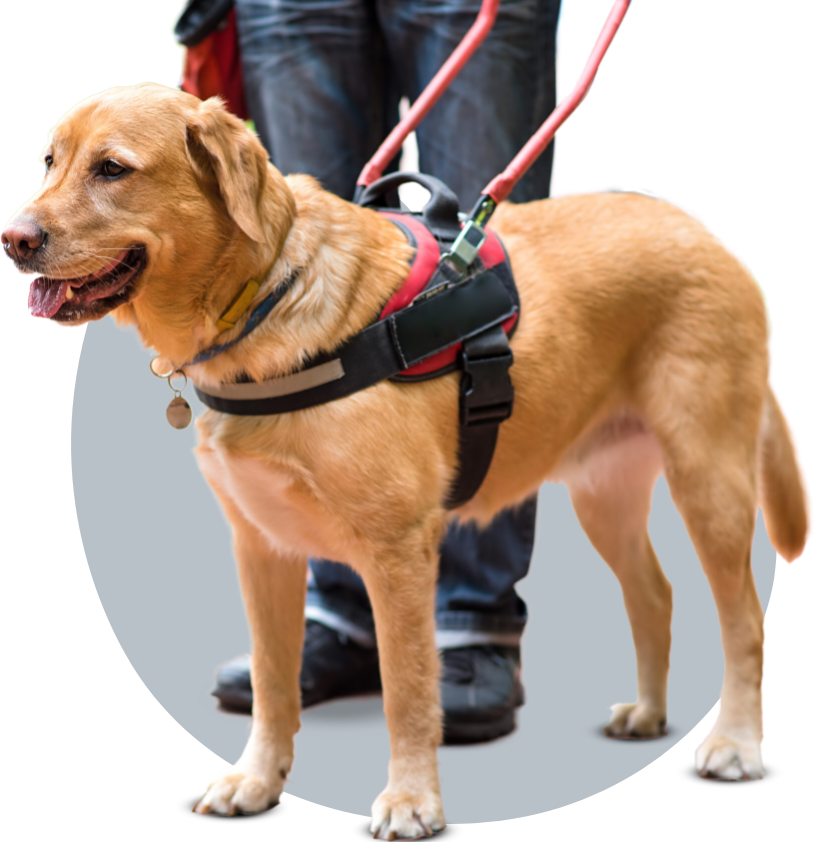Understanding the Positive Effects of Emotional Support Animals

How Emotional Support Animals Improve Mental Health
The average person who deals with depression, anxiety, or other health conditions does it on their own. Sure, they have health care providers and maybe a therapist, but for the most part, they have limited support. Friends and family get busy. Doctors and therapists are only available during regular office hours. An animal, on the other hand, doesn’t have a schedule and is always at your side. If you already have a cuddly pet, you know how important they are to your well-being. An emotional support animal (ESA) can change your life! Today’s post covers the impact ESAs have on their owner’s lives. Learn about the positive things you could experience with an ESA support dog by your side.
A New Look on Life
If you suffer from depression, you know it’s more than feeling tired or not up to par a few days a week. Depression takes over and moves in for the long-haul. Most people who deal with depression experience a range of symptoms, but one common thread is a loss of hope. It’s difficult to plod through daily life without hope for the future. People without hope often have trouble caring for themselves and others. Spending time with a pet, especially one with a wagging tail and soulful eyes, can alleviate the symptoms of depression. As your mood lifts, you’ll feel hopeful again. While not a substitute for medication prescribed by your doctor, you could think of an ESA as a component of your treatment program.
Help for Anxiety
There’s a reason why so many people bring their ESA when they travel, especially on airplanes. It’s not uncommon for people to get anxious when they fly. For some, the anxiety is paralyzing and, in extreme cases, prevents the person from traveling by plane, which can put a damper on seeing the world. Traveling with an ESA may help alleviate some of the anxiety. While taking anti-anxiety medication may work, an ESA offers a different kind of relief. When you focus on your dog, instead of the fear of airplanes, you’ll usually relax and even enjoy your travel experience. By the way, simply petting your ESA can relieve anxiety, whether you’re on a plane, or sitting in your living room.
They Love You Back
The joy of owning a pet is the unconditional love they give, no matter what. An ESA doesn’t care if you’re feeling out of sorts. They love you anyway! There’s nothing like the unconditional love of an animal, but it’s especially helpful to a person with emotional health issues. It’s not uncommon for a person who has a mental health condition to feel unlovable. At the least, they may not feel like being around people. Your ESA will stay by your side, loving you right through the dark moments.

An Integral Part of Treatment
While they’re not a substitute for medical or mental health care, ESAs work as part of your overall treatment. Whether you exercise or practice mindfulness, you can incorporate time with your ESA into your treatment methods. When you need to ground yourself, you can focus on your animal. If you use exercise, your ESA can help motivate you to walk or run every day. Since they’re an essential part of treatment, you should consider ESA dog registration. Registering your ESA opens up a world of benefits, including the ability to show people that your animal is a legitimate support animal. For help with registration, contact National Service Animal Registry at (719) 756-2634 today!
Positive Chemical Changes in the Brain
Pets, especially dogs, have become a central part of today’s society with many of them working as full-time ESAs. The positive effects of emotional support animals can be attributed to the bond that builds between you and your ESA and how you feel when you are around them. A lot of behind-the-scenes chemical and neurological changes add up to create this feeling. Let’s take a look at the science behind emotional support animals.
Studies have shown that when you cuddle or pet your dog or ESA, oxytocin is released. Oxytocin is a neurotransmitter that is associated with feelings of love, affection, and bonding. And this has an amazing impact on the brain and body. Oxytocin reduces heart rate, blood pressure, and most importantly, the production of the stress hormone, cortisol. This is why you feel calm and less anxious when you are with a dog.
That’s not all. When you interact with your ESA, it boosts the release of beta-endorphins in the brain. This hormone blocks the sensation of pain thus helping you with pain management. It also lowers bodily stress and increases the level of dopamine. Dopamine is known as the feel-good hormone, all for good reason. This hormone is a part of your reward system. It boosts focus and builds motivation, thus pushing you to do better and achieve your goals.
Reducing the Feeling of Loneliness & Isolation
Mental health benefits of having an ESA extend beyond the boost in feel-good hormones, dopamine and oxytocin. ESAs have been found to reduce loneliness with their ability to respond to their handlers intuitively at the time of crisis. There’s also a science behind this capability of emotional support animals.
We all feel lonely at some point in our lives. It can often be a result of major life changes, circumstances that cause us to live alone, being separated from someone, death of a loved one, and so on. While feelings of loneliness are natural, they can become detrimental to our mental health if they are prolonged. Here’s what happens if these feelings are left untreated: the release of happy hormones, dopamine and serotonin are reduced. This in turn reinforces the feeling of loneliness, causing a feedback loop. This drives a person further down into isolation.
ESAs help break this cycle by boosting the happy hormones. They also force you out of routines by pushing you to take care of them. ESAs need to be taken on walks, to the veterinary, etc., thus giving you a purpose. A purpose keeps our brains happy and reduces the feeling of loneliness.
It’s quite common to talk to your ESA even though you do not share a common language. When you talk to your pet, you subconsciously imagine a mind that understands and their responsiveness sort of enforces that tendency. Also, when you have an ESA with you, it becomes easier to meet new people. You can join pet groups and interact with like-minded people.
Daily Exercise
The effects of emotional support animals extends beyond mental health. Owning an ESA, especially a dog, is closely associated with physical activity. Dogs require to be walked and played with regularly. This will push you to go outside for a set amount of time every day. Brisk walking qualifies as moderate-intensity exercise. Benefits include weight control, improved muscle strength, better cardiorespiratory fitness, etc. It reduces the risk of heart disease, diabetes, stroke, and other deadly diseases.
Since the body and mind are inherently connected, physical exercise translates into brain health. This means when you take action to make an impact on how your body is functioning, it also impacts how your brain functions. Your endorphin levels increase and as a result, you feel a sense of achievement after a physical exercise session. This does a lot of good for your emotional health. When you start to feel better about yourself, you will find more meaning in your tasks and a heightened sense of identity. That is how effective emotional support animals are.
Who Can Benefit the Most from Emotional Support Animals?
If you are suffering from any kind of emotional or mental instability, you qualify for an ESA. If you have a pet, you already know how much you depend on them in times of loneliness and emotional crisis and how they fill your home with love and happiness. While an ESA is not a pet, it brings the same joy to your life and works extra to help you cope with your emotional disability. Naturally, there are some groups of individuals who benefit more from the effects of emotional support animals than others.
- Anyone Suffering from Anxiety, PTSD, Depression
ESAs work in conjunction with medication for people with psychiatric conditions like bipolar disorder, schizophrenia, post-traumatic stress disorder, depression, etc. to provide therapeutic benefits by alleviating some of the symptoms. ESAs are highly intuitive, can sense when their handler is becoming stressed, and provide immediate comfort.
- ESA for Kids & College Students
ESAs have been found to be an effective step in psychotherapy for children, adolescents, and college students with mild depressive symptoms caused due to living away from home, parents’ divorce, loneliness, trauma, etc. These animals can intervene before these symptoms progress into major depressive disorder. ESAs also help with social involvement and interaction, communication trouble, transition difficulty, etc.
- War Veterans
The effects of emotional support animals extends in areas of psychological and emotional disturbances experienced by not just war veterans but also active-duty soldiers. ESAs help alleviate PTSD symptoms, improve sleeping patterns, provide assistance during nightmares and stressful situations, and so on.
- Patients in Palliative Care
Emotional support animals provide comfort and companionship for hospice patients. Just the act of stroking alleviates anxiety and improves mood. They provide unconditional love, a non-judgmental listening ear, and a sense of calm to patients. From quiet comforting to laughter, ESAs can lift your spirits instantly.
Get Your ESA Letter Today
If you already have a pet who also assists with your emotional health, you can get it registered at the National Service Animal Registry to further legitimize your ESA and enjoy extended benefits. We provide ESA letters that can help you with your accommodation. Our registration kits contain certificates, ID cards, vests, etc. that you can use to avoid confrontations when you take your ESA out with you. Order your registration kit and ESA letter today.














































































